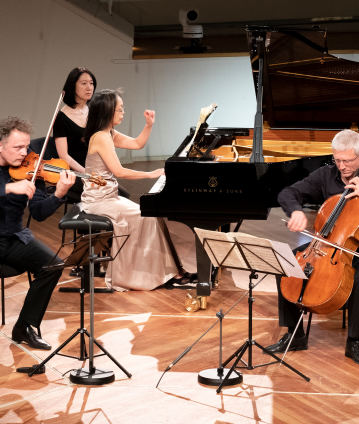The Philharmonia Piano Trio plays Dvořák, Suk and Martinů

The Philharmonia Piano Trio presents three Czech composers who combined the cultivation of their national idiom with an openness to international influences: Dvořák was inspired by Ukrainian folk songs for his famous “Dumky Trio”. Slavic spirit also characterises the two works by Dvořák’s pupil and son-in-law Josef Suk. Bohuslav Martinů’s Trio No. 3 with its captivating rhythms is a homage to his Czech homeland.
Chief conductor Kirill Petrenko’s passion for the music of Josef Suk has been transferred to the members of the Berliner Philharmoniker: the Philharmonia Piano Trio, in which violinist Philipp Bohnen and cellist Nikolaus Römisch perform with pianist Kyoko Hosono, presents two works by the Czech composer in this concert.
Suk began working on his Piano Trio op. 2 at the age of 15. Antonín Dvořák, the talented composer’s teacher, was involved in correcting and tightening the score. The trio captivates with its emotional maturity and its elaborate structure, but at the same time reveals itself as a youthful work in the fiery finale. Suk’s Elegie, composed in 1902, stands out through its memorable and poignantly melancholy melody.
Bohuslav Martinů received violin lessons from Suk at the conservatory in Prague before continuing his studies in Paris. When his music was banned in his homeland by the National Socialists, Martinů emigrated to the USA. Here he wrote his Third Piano Trio, which was premiered in 1952. In addition to echoes of Czech folk music, it is the delightful contrast between driving motoric and meditative interludes that makes Martinů’s tonal language unmistakable.
The final work is Antonín Dvořák’s most popular piano trio. The nickname “Dumky” refers to a Ukrainian folk dance characterised by the alternation of elegiac and cheerful passages. The dances follow one another here with Dvořák’s typical profusion of thematic figures. Or as Johannes Brahms said about his “best music friend”: “The fellow has more ideas than all of us. Anyone else could scavenge main themes out of his scraps.”
© 2023 Berlin Phil Media GmbH
Category
Our recommendations
- Philharmonic chamber music: On the trail of your own identity
- Philharmonic String Quartet: Music of remembrance
- Philharmonic chamber music: Piano quintets by Mozart and Beethoven
- The Berlin Phil Series: Philharmonic Octet Berlin
- The Berlin Phil Series: An American in Berlin
- Philharmonic chamber music: String quartets by Schumann and Rihm